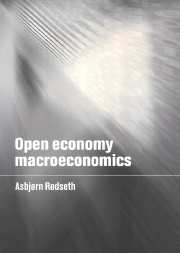Introduction
Published online by Cambridge University Press: 06 July 2010
Summary
The field
An economy is ‘open’ when it trades with other countries in goods, services and financial assets. Today, with few if any exceptions, all countries are open. Thus, it may seem odd to have a special branch of economics that is labelled ‘open economy macroeconomics’.
It is customary to see economics as divided in two main branches, microeconomics and macroeconomics. Personally I prefer a classification where at the top level there is general economic theory (most of that now classified as ‘microeconomics’); this is highly abstract and provides us with a tool-kit that we use in a number of applied fields, macroeconomics being one. Macroeconomics tries to explain the behaviour of certain economy-wide aggregates (GDP, the price level, the current account, etc.), and takes a particular interest in aggregative aspects of fiscal and monetary policy. Ultimately one is then interested in open economies. However, in order to explain the relevant aggregates we need to study a large number of behavioural mechanisms that take part in their determination: consumption demand, investment demand, wage-setting, expectations formation, etc. In the end we try to integrate these mechanisms into a common framework, a model, which explains the aggregates. Different branches of macroeconomics focus on different mechanisms that should ultimately be woven into the same picture. In open economy macroeconomics the focus is on the behavioural mechanisms that are specifically and most directly related to international trade in goods, services and financial assets.
- Type
- Chapter
- Information
- Open Economy Macroeconomics , pp. 1 - 6Publisher: Cambridge University PressPrint publication year: 2000



